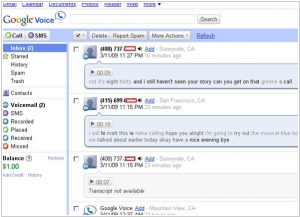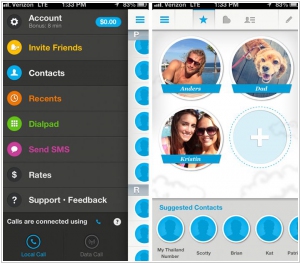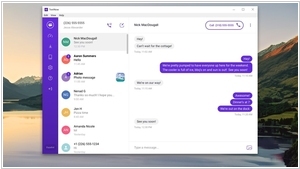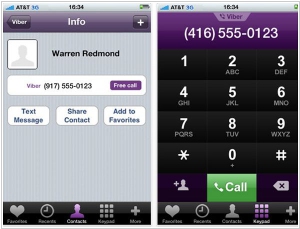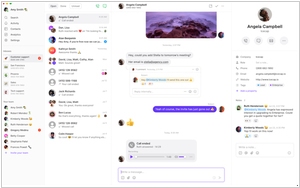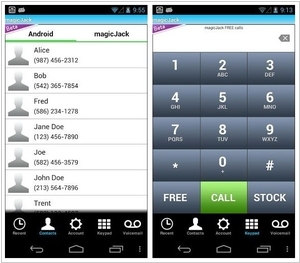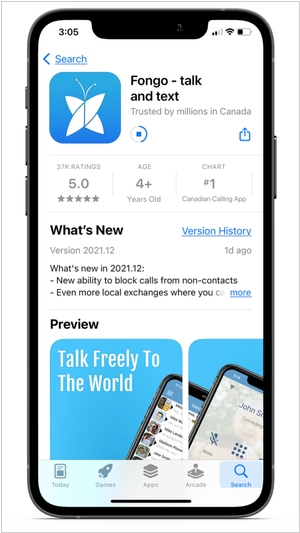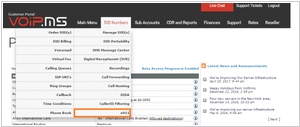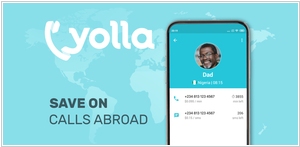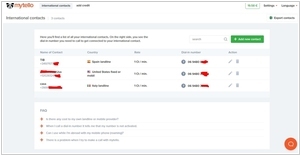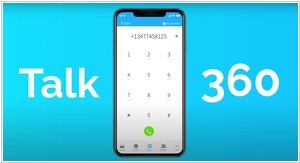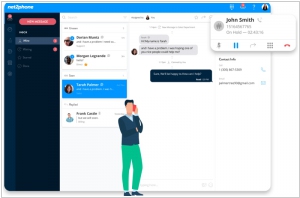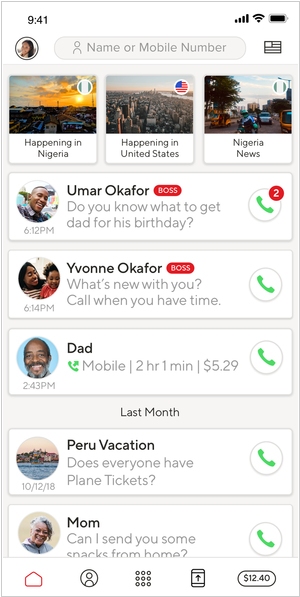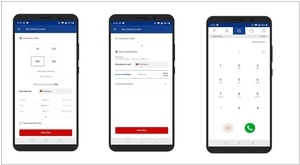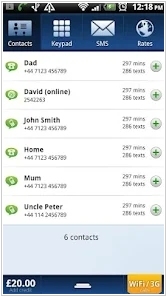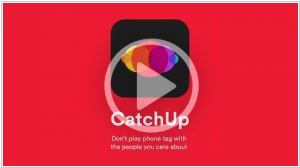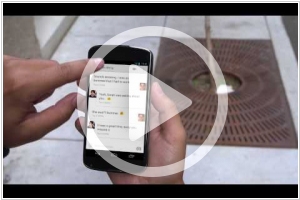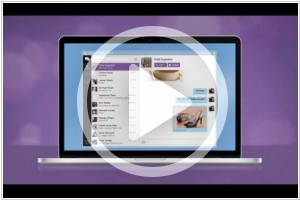Top 10 VoIP services
April 24, 2024 | Editor: Adam Levine
12
VoIP services allow to make cheap international voice calls to mobiles and landlines and register local phone numbers in other countries.
1
Skype is a software application that allows users to make voice and video calls and chats over the Internet. Calls to other users within the Skype service are free, while calls to both traditional landline telephones and mobile phones can be made for a fee using a debit-based user account system. Skype has also become popular for its additional features which include instant messaging, file transfer, and videoconferencing. Skype alternative for enterprise is called Skype for Business.
2
Google Voice is a telephone service that provides call forwarding and voicemail services, voice and text messaging as well as international call termination for Google Account owners and for G Suite customers.
3
Free calls to Rebtel users and cheap international calling to everyone else – Use WiFi, 3G or local minutes to make calls. Call abroad at some of the world's lowest rates. Free calls and texts to other Rebtel users. No commitment - your first call is free
5
Viber is a mobile app that provides free international calls and text messages to other Viber users using 3G or Wi-Fi. Uses your existing contact list - check out which of your phone contacts and friends is already on Viber so that you can call and text them for free.
6
Modern business phone for startups and small business. OpenPhone brings your business calls, texts, and contacts into one delightful app. Work anywhere, across all your devices.
7
Smart and affordable VoIP service with great features. You can communicate using your computer or regular telephone. With the magicApp companion app, you can have your magicJack and smartphone ring simultaneously.
9
VoIP.ms is your best choice for your business phone system. Widely recognized for its customer service.
11
With mytello you can make cheap international calls. Our service works from any landline or cell phone.
12
Talk360 international calling app allows reliable and affordable phone calls to any offline landline or mobile phone in the world.
13
net2phone's world-class phone system keeps your business running in and out of the office.
14
BOSS Revolution makes it simple & cheap to stay in touch with loved ones, with high quality international calling, mobile airtime top ups & money transfers.
15
KeepCalling.com makes international calls really affordable with Voice Credit & Monthly Plans
16
Localphone allows to make cheap international calls from your mobile, landline or computer or rent an Incoming Number
Latest news about VoIP services
2020. Facebook launches CatchUp, an audio-only calling app
Facebook has introduced an application called CatchUp, which can be considered as a phone call version of Houseparty (excluding video calls). CatchUp, available for free download, enables users to view the availability of their contacts for voice chats and facilitates initiating both one-on-one and group calls within the app. CatchUp operates as a standalone application and is not linked to the Facebook app. It does not require a Facebook account or an account with any other Facebook-owned company for usage. As CatchUp falls under Facebook's "experimental" division, its potential impact on the business aspect remains uncertain, pending the app's level of success.
2020. Truphone raises $38M at $516M valuation for its eSIM business
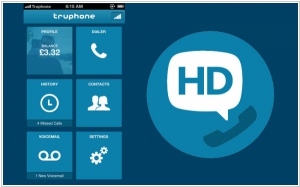
Truphone, a startup based in the UK, has recently secured $38 million in funding. The company specializes in providing voice and data services for phones, tablets, and IoT hardware through its eSIM software, which is directly integrated into the devices. With a global reach, Truphone has already provisioned approximately 4 million eSIM profiles and continues to witness a daily increase in eSIM downloads, with a rate of 20,000 per day. Notably, eSIM technology was initially developed as a convenient way to switch carriers without the need to physically change small, intricate physical cards and associated carrier contracts. However, the current climate emphasizes the significance of contactless technology and transactions, as it enables individuals to minimize physical contact and reduce the potential spread of the novel coronavirus.
2019. Anti-spam service Truecaller adds free voice calling feature
Truecaller, renowned for its call screening capabilities against unknown callers and spammers, is introducing a new addition to its service: free VoIP-powered voice calls. The company has begun rolling out this feature to its Android users and plans to bring it to its iOS app in the near future. Currently, the voice calling feature supports calls exclusively between two users. Truecaller's expansion of its services with voice calling functionality aligns with its ambitious growth strategy. In recent years, the platform has incorporated messaging, mobile payment, and call recording features, alongside its ad-supported free tier and subscription bundle offerings. Earlier this year, Truecaller even introduced a credit option, enabling users in India to borrow a small sum of money.
2019. Business communications service Movius raises $45M

Movius, a company specializing in enabling businesses to allocate a separate business number for voice calls and texting on any mobile device, recently completed a Series D funding round, securing $45 million. With this latest investment, the company's total funding reaches $100 million. Currently, Movius boasts over 1,400 businesses as its valued customers, and it has partnered with renowned carriers such as Sprint, Telstra, and Telefonica. It's crucial to understand that Movius surpasses the functionality of a basic VoIP app found on your phone. The company delivers a carrier-grade network that empowers businesses to assign a secondary number to their employees' personal devices. Consequently, employers retain control even when employees bring their own devices to the workplace.
2017. VoIP vet Truphone raised $339M
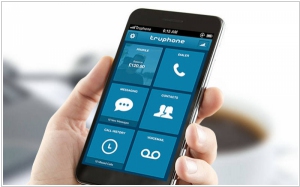
Mobile VoIP-provider Truphone, operating since 2006, has secured a significant funding of $339 million. The company intends to utilize this funding to pay off its debt and focus on expanding its data connectivity services beyond mobile phones to cater to the increasing demand for connected devices. The emergence of new smart devices that heavily rely on internet connectivity has given rise to a new wave of startups specializing in providing such connectivity. Alongside Truphone, other notable players in this field include Skype and Cubic Telecom, which collaborates with Audi on connected vehicles and has recently raised funds to support its own growth. It is noteworthy that Truphone's fundamental technology forms the foundation for both its existing business and its aspirations to tap into future opportunities.
2017. Viber acquired shopping keyboard startup Chatter Commerce
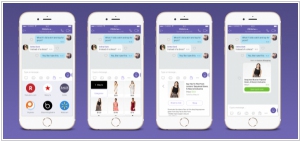
Earlier this year, messaging app Viber ventured into shopping services with its Instant Shopping feature, enabling users to search for items available for purchase directly within the app's interface. In a strategic move to compete with alternative platforms, Viber has recently acquired Chatter Commerce, the startup that played a significant role in developing this feature. This acquisition positions Viber to enhance its shopping capabilities. Speculations suggest that even Amazon is working on a consumer-centric messaging app. Additionally, Facebook has been expanding Messenger beyond basic chat, incorporating transactional features, bots, and other services. This highlights a notable trend among messaging apps, leveraging their existing user engagement to drive business growth through various avenues.
2017. Viber introduced secret chats with self-destructing messages
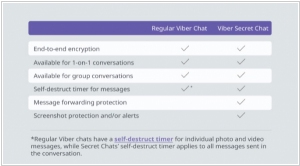
Viber has released an update for its iOS and Android versions, introducing the highly anticipated feature of "Secret Chats" to the service. Following in the footsteps of Snapchat, Facebook, Telegram, and other platforms, Viber now allows its users to set timers on their messages, resulting in self-destruction after a specified duration. Additionally, this new feature notifies the sender if the recipient takes a screenshot, a functionality initially popularized by Snapchat. Viber appears to be emphasizing its commitment to security by showcasing these features, setting itself apart from other messaging platforms. The introduction of end-to-end encryption and hidden chats last year further solidified Viber's dedication to privacy and security.
2017. Viber adds e-commerce feature
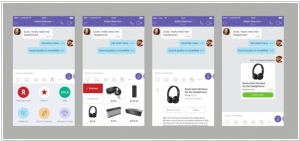
Messaging app Viber, owned by e-commerce company Rakuten, aims to capitalize on e-commerce while avoiding intrusive advertising. Viber plans to introduce a new feature where users can explore items for sale related to their current chat by tapping on a small shopping bag icon at the bottom of the screen and conducting a search. The initial launch of this feature will take place in the U.S. on March 6, with plans to expand to other markets later. Users will not be able to make purchases directly within Viber; instead, they will be redirected to the relevant page in the respective brand's app via a deeplink.
2017. Google Voice gets group chat and other new features
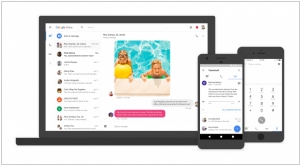
Google has introduced a refreshed version of its VoIP calling service, Google Voice, across mobile and web platforms. The primary focus of this update is to provide the product with a modernized look and feel, as it had not received significant upgrades for quite some time. Alongside the visual enhancements, the relaunch brings several new features, including photo-sharing, group conversations, Spanish-language voicemail transcription, and more. In the updated app, Google Voice incorporates separate tabs in the inbox for text messages, calls, and voicemail, as explained in the company's blog post. Additionally, conversations now remain in a continuous thread, simplifying the process of keeping track of messages from contacts within a single location.
2016. Viber launched Public Accounts for businesses
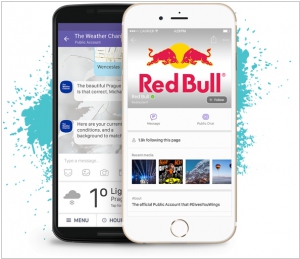
Messaging app Viber is introducing Public Accounts for businesses and brands seeking to engage with Viber users for marketing purposes, customer service, or a combination of both, without the requirement of adding the account as a contact first. Users can now simply subscribe to these accounts. Additionally, by the end of November, Viber's API will be seamlessly integrated with approximately 10 to 15 popular CRM packages, enabling businesses to manage their Viber messages alongside their other social media, email, and messaging interactions. With the introduction of Public Accounts, Viber joins the ranks of other consumer-focused messaging apps such as WeChat, Line, and Facebook Messenger, all of which offer similar features.
2016. Truecaller will be preinstalled on Huawei phones
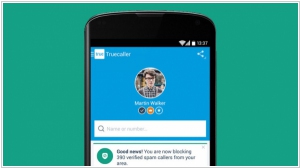
Stockholm-based Truecaller, renowned for its caller app with integrated social features and a crowdsourced directory to combat spam calls, has secured a partnership with Huawei. As a result, Truecaller's caller ID and smart phone book app will come pre-installed on Huawei smartphones. In March, Truecaller merged its standalone social calling app, Truedialler, into its primary application. The company recently disclosed that its users now generate over 500 million calls per month, with an average call duration of approximately 100 seconds. This achievement is noteworthy, especially considering that WhatsApp recorded 100 million in-app calls per day earlier this year, despite having more than a billion active users.
2016. Viber adds end-to-end encryption and hidden chats
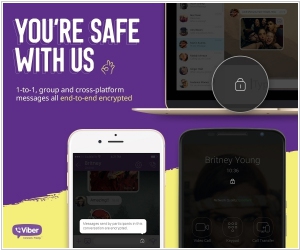
Following in the footsteps of WhatsApp, Viber, another popular messaging app, has introduced end-to-end encryption for all messages and calls on its platform, including group chats (supporting up to 200 people). Additionally, Viber now offers a feature to 'hide' chats on your account, complementing its existing expanded deleting function. These new privacy features are available across Android, iOS, PCs, and Mac desktops, and can be activated by updating to the latest app version (6.0) and reauthenticating the app via QR Code. Viber's encryption provides different levels of security, visually represented by a color-coded lock displayed on the right side of the screen.
2016. Rebtel adds unlimited international calling
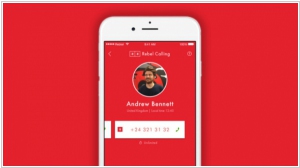
VoIP provider Rebtel has introduced Rebel Calling to the United States, enabling unlimited and free app-to-app calling without the necessity of a WiFi connection. In most cases, when making international calls, individuals encounter exorbitant charges or resort to applications like WhatsApp. Without WiFi, applications such as WhatsApp or FaceTime Audio consume users' data allowances for calls. However, with Rebel, the app employs a data (or WiFi) connection to initiate an app-to-app call, which is then routed through local phone lines. This method does not utilize data and does not necessitate WiFi, allowing users to make international calls while on the move without depleting their data plan. The Rebel Calling service is currently available for over 50 countries, including the U.S., and will eventually require a $1/month fee starting in 2017.
2015. Yahoo Messenger becomes a mobile messenger
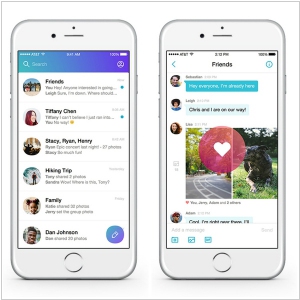
Yahoo Messenger is being revitalized by Yahoo with a set of fresh messaging apps, breathing new life into the platform. While the older web-based version of Yahoo Messenger will receive support for a few more months, it will eventually be retired, according to the company's announcement. The new Yahoo Messenger app bears similarities to popular messaging apps like WhatsApp and Facebook Messenger, but it boasts its own unique features. These include a built-in GIF search powered by Tumblr and the ability to instantly share large numbers of photos, regardless of the network you're on (Wi-Fi or data connection), thanks to Flickr integration. Moreover, users can like individual messages within a conversation and even undo a sent message at any time. The new Yahoo Messenger is available as an iOS and Android app, as well as a web app that can be accessed within Yahoo Mail on desktop. In this setting, it operates in a manner similar to Google Hangouts in Gmail.
2015. Truecaller launched new Android Messaging app
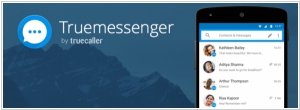
Introducing a new service called Truemessenger, Truecaller aims to enhance the SMS experience by reducing spam and improving message management. Truemessenger is an Android app designed to replace the default SMS application. Leveraging the vast network of Truecaller users, it verifies the identity of individuals sending text messages. If a user receives a spam message, Truemessenger enables them to contribute to the community by labeling the sender as a nuisance in their contact list. The app operates on the same principles as Truecaller: user-identified spam calls and SMS are recorded in the directory, enabling identification of the same spammers when they contact other users. Users also have the flexibility to establish their own spam rules, similar to managing email filters. By identifying and categorizing spam messages, Truemessenger segregates them into a separate folder, keeping the general SMS inbox clutter-free.
2015. Visual voicemail provider YouMail gets $5М
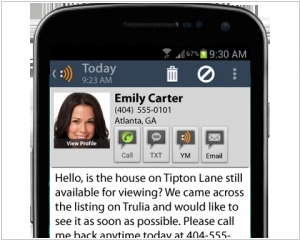
YouMail, a visual voicemail app, has announced its intention to utilize the funds raised in a Series B funding round of $5.5 million to grow its user base. YouMail serves as a digital personal assistant, replacing traditional voicemail on Android, iPhone, and Windows Phones. Its primary purpose is to identify incoming callers, filter out unwanted calls, present personalized greetings, collect contact information, and provide alternative means of contact. The app offers a range of features, including visual caller ID, automated caller blocking, customized smart greetings, automatic responses, cloud storage for messages, and the ability to access messages and route calls across multiple platforms.
2014. Viber adds public chats
Messaging app Viber is set to unveil a new social feature called Public Chats, which allows users to leverage its direct messaging and voice services for broadcasting to a wider audience. With Public Chats, users will have access to live conversation streams from celebrities and other interesting individuals, providing followers with the opportunity to observe the discussions without necessarily participating in them. Users will only be able to engage in Public Chats if the corresponding account is in their contacts. Currently, there is no universal option for enabling public streams, but those who believe their chats are Public Chat-worthy can contact publicchats@viber.com.
2014. Truecaller gets a sister-app for dialing
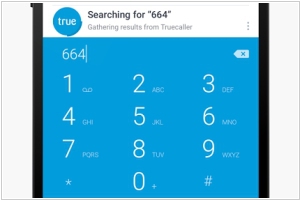
The creators of Truecaller, the popular app that provides useful information about incoming calls, have introduced a complementary app for outgoing calls called Truedialer. Initially launched exclusively for Android, Truedialer serves as a dialer application that leverages a vast database of phone numbers. As users enter a number, the app searches for autocomplete options using the extensive database. This database is sourced from various channels, including Truecaller's original service, collaborations with phonebook providers, third-party sources like Yelp and Twitter, and user-contributed contact books. These efforts enhance the quality of contact information displayed in call logs. While Truecaller informs users about incoming calls from known spammers, Truedialer takes on the task of alerting users if they are dialing a potentially suspicious or questionable number. This added feature adds an extra layer of security and awareness to the app's functionality.
2014. Contact identification app Truecaller scores $60 Million
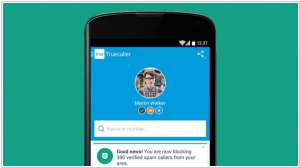
Truecaller, a mobile application for phone directory and caller identification, has successfully raised $60 Million in Series C funding. Truecaller offers a valuable feature that facilitates bridging the gap between various mobile services, platforms, carriers, and apps. This service has gained popularity in countries where a significant number of mobile users rely heavily on calls or apps utilizing phone numbers, such as WhatsApp, but lack comprehensive directory services to locate and connect with others. Truecaller's platform combines existing directory services through partnerships with white pages companies and platforms like Yelp, while also incorporating crowdsourced information from the app's users. Additionally, it provides spam call filters and proudly presents the number of nuisance calls it has saved users from receiving.
2014. Japanese internet giant acquires Viber
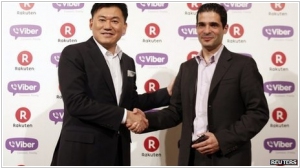
The Japanese company Rakuten has made a significant acquisition, securing Viber, which is currently considered one of Skype's main competitors, for a whopping $900 million. This development brings to mind the recent acquisition of fring by the American company Genband, which resulted in fring being transformed into a white-label communication platform tailored for telecom providers. However, there is no need to worry about Viber in this case. Rakuten does not intend to shut it down or reshape it according to its own business model. Instead, they plan to invest money into Viber with the hopes of competing against Skype and eventually recouping their investments, possibly through the sale of ViberOut voice call minutes. Rakuten is known for its diverse business ventures, including investments in internet startups. For instance, they own the ebook platform Kobo, have a stake in Pinterest, Play.com, and other online projects. For those unfamiliar, Viber is a cross-platform instant messenger renowned for its support of free voice and video calls. Currently, the service boasts around 300 million users.
2013. Skype gives free group videochat and screen-sharing for 2014

Occasionally, the Skype (or Microsoft) team ventures into peculiar projects and attempts to integrate them with Skype. For instance, about a year ago, they made an effort to launch the social network Skype In The Workspace. More recently, they introduced the Skype Collaboration Project earlier this month. This project serves as a platform for creative individuals to engage with the industries they are passionate about, find inspiration, and so on, including some mentions about Victoria Beckham and other details. However, this endeavor did yield a significant benefit: to bring attention to the site, Skype is currently running an exciting holiday promotion. Visitors who explore the Skype Collaboration Project and provide their email address can enjoy premium account features for an entire year. These features include group video chat, screen-sharing, and an ad-free experience.
2013. Viber now can call landline and mobile phones
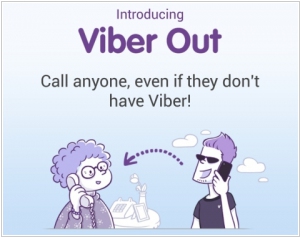
Despite Microsoft's hands-off approach to Skype, the majority of people continue to rely on it. However, even the slightest misstep from Microsoft could pave the way for alternative services vying to replace Skype as the de facto standard for internet communications. Leading the pack is Viber. This service has gained significant popularity, boasting over 200 million users, thanks to its mobile-first strategy and simple authorization via mobile numbers. Currently, Viber and Skype offer virtually identical features. Recently, Viber addressed one of its remaining gaps by introducing the ability to make calls to landline and mobile phones at affordable rates, which are slightly lower than Skype's. For instance, calls to Indian landlines cost 2.5 cents (4.5 cents to mobile phones), calls to Mexico cost 2.3 cents (9.9 cents to mobile phones), calls to all China numbers cost 2.3 cents, and calls to the U.K. cost 1.9 cents (5.9 cents to mobile phones). This new feature is available on Android, iPhone, and Viber desktop (PC and Mac) platforms.
2013. Google invented desktop-apps. Inbuilt own Start button into Windows
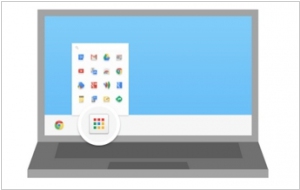
Today commemorates the 5th anniversary of Google Chrome, and in their blog post published today, Google begins by stating that five years ago, they initiated the Chrome project with the aim of advancing the Web platform... and so on. Subsequently, they unveil the latest milestone achieved by this Web platform: desktop applications. Going forward, the Chrome browser for Windows and Chrome OS will support applications that can operate entirely on the desktop, without requiring an internet connection. To accommodate these applications, a dedicated section has been established within the Chrome App Store. Furthermore, Google introduces the Chrome App Launcher for Windows—a taskbar button that, upon activation, displays a list of installed Chrome apps (similar to the regular Start button). The apps launched from this list open in their own windows, akin to typical Windows programs, rather than within the web browser. Thus, it appears that Google is not concerned about the distinction between web and non-web. Their objective is simply to supplant Windows with Chrome on users' computers.
2013. Why your business needs SmartWatch?
Today Samsung has unveiled its first smartwatch - Galaxy Gear. Why executives and business people need such gadget? Of course for sales and good deals. Imagine: you coming to the office of potential customer or partner, the phone sound rigns and you answer via your smartwatch: "I 'll call you later". Of course, after that, your potential customer will ask you something about your watch, you'll tell something, and the talks will go easier (and your image will grow). Ok, it's clear. And what benefits can the smartwatch bring to organize your life? For now the Samsung's watch - it just a bluetooth-connected add-on for the phone (Galaxy Note). Without the phone in your pocket you can't make phone calls, receive SMS, email, reminders. ***
2013. Microsoft to acquire Nokia (cheaper than Skype)
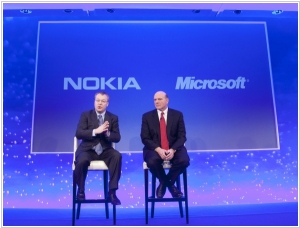
Microsoft has made a noteworthy announcement regarding their acquisition of Nokia's devices and services business for $7.1 billion. It is worth noting that Microsoft previously acquired Skype for $8.5 billion. The relatively low price of this acquisition may not come as a surprise considering the circumstances. After all, Nokia is led by Stephen Elop, who was a former employee of Microsoft and is also a leading candidate for the position of Microsoft CEO after Steve Ballmer's retirement. This gives the impression of a familial agreement. Microsoft had appointed Elop as the head of Nokia in 2010, establishing a close partnership between the two companies. Nokia then became a prominent manufacturer of Windows Phone smartphones, although they experienced limited success with this venture. Perhaps, to prevent Nokia from exploring opportunities with Android, Microsoft decided to acquire the company. As a result of this deal, Stephen Elop will assume the role of Microsoft's Vice President of Devices and Services, likely until Ballmer's departure.
2013. Zangi wants to defeat Skype
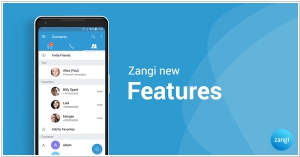
Today Skype turns 10 years. Already 10 years Skype is the most popular service for VoIP / video calls. But one day the One will come and defeat Zangi. Maybe it will be Google Hangouts, or Viber, or Tango, or ooVoo, or Nimbuzz. And maybe - the new startup - Zangi, that will launch globally in October. What is the brilliant idea of Zangi? They want to create really unified communications tool that can connect two people, no matter where they are, what device they use and what connection they have. Unlike Skype, that works only via Internet, Zangi allows to connect via GSM (using call-back). In addition, it allows to send SMS and support calls via browser (web interface). Unlike Viber, Zangi allows you to make video calls. ***
2013. Microsoft connected Lync and Skype
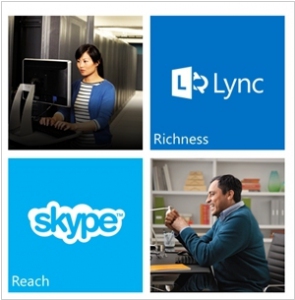
Almost 300 million people around the world use Skype. This is a very large customer base, that's why many companies add skype-address to their contacts in order to offer customers a convenient communication channel. But in large companies using Skype at the workplace - doesn't fit the corporate security policy. Therefore, the integration of Skype with Lync communication server can become a breakthrough for deploying Skype in large companies. And thus Microsoft can get a significant competitive advantage over Cisco, Avaya and other enterprise communication vendors. That's was the main reason why Microsoft acquired Skype for a lot of money. ***
2013. Google unites GTalk and Hangouts
Google's engineers are currently occupied with a multitude of tasks, particularly those related to Google Glass, which leaves little time for addressing other essential products. For several years, we have eagerly anticipated Google's integration of its various communication services, aiming to create a competitive alternative to Skype. Finally, after a few weeks of dedicated effort, they have made significant progress in this endeavor. Google Talk messenger has been replaced by Google Hangouts, a video chat service. Google has launched two mobile apps for Hangouts, available on Android and iOS platforms. Moreover, Hangouts can be accessed through Gmail and Google+. The beauty of Hangouts lies in its synchronized chat applications, allowing users to initiate conversations on their computers (via Gmail) and continue them seamlessly on their mobile devices while away from the office. The chat feature supports the insertion of pictures and videos from YouTube, while video chat can accommodate up to 10 participants simultaneously. Unfortunately, Google has not yet integrated Hangouts with Google Voice, which means SMS cannot be sent through Hangouts, and voice calls are not yet available. At present, users can choose between sending a message or making a video call, as voice calls are not supported within Hangouts.
2013. Outlook.com users will be able to chat with their Google contacts
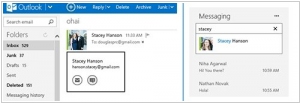
Upon reading the headline of this news, one might have hoped for a miraculous change where IT giants set aside their differences and embraced open standards for the collective benefit. However, the reality is much more pragmatic. Microsoft and Google still hold their reservations towards each other. Microsoft's objective is to migrate Gmail users to its own Outlook.com platform, and one of the barriers preventing such a transition is the inability to chat with contacts "stuck on Gmail" (as quoted from Microsoft's blog). Within a few days, Microsoft plans to introduce this feature within Outlook.com. It's worth noting that Outlook users already have the ability to chat with contacts from Skype and Facebook.
2013. Viber launched desktop version
While Skype was slow to make its move onto mobile platforms, mobile video chat service Viber managed to capture widespread popularity. With a user base of 200 million, it appears to be at the forefront of services aiming to replace Skype as the go-to independent communication app. Just yesterday, Viber released desktop versions for both PC and Mac. However, to utilize these desktop versions, it is still necessary to first install the mobile app since Viber accounts are linked to phone numbers. Notably, the most intriguing feature of Viber's desktop version is its seamless transition between desktop and smartphone without interrupting ongoing calls. Furthermore, all messages and contacts are automatically synchronized between the mobile and desktop versions, and incoming calls are directed exclusively to the device (computer) currently in use.


